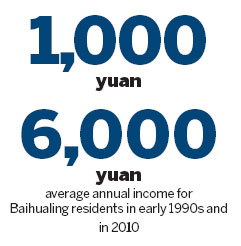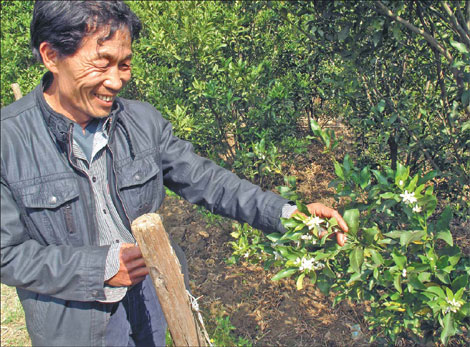Society
Changing fortunes
Updated: 2011-04-19 08:47
By Chen Liang (China Daily)
In 2010, his chestnut trees yielded 3.5 tons of chestnuts and earned him 10,000 yuan. His 8 mu of coffee, planted on the lower slopes, yielded 1 ton of coffee and earned him more than 20,000 yuan. The family also has 4 mu of persimmon trees.
|
Bai Hualing villager Chen Shihou checks his blossoming tangerine trees. Photos by Chen Liang / China Daily |
He now has a brick house and of his two daughters, one works in the city and the other studies at a college in Baoshan.
"When I tried to persuade other villagers to plant chestnut trees in 1996, rumors floated around that I was getting 50 yuan (for every convert) from the reserve," he says. "Some even said planting chestnut trees was meant for those too lazy to do anything else."
No one would harbor such thoughts now, says Hou Xingzhong, head of Baihualing village and fourth president of the association. In the 536-household village of more than 2,400, he says, every family is growing two or three kinds of cash crops including coffee, chestnut, walnut, persimmon and tangerine. Some are planting them all.
"Before 1996, rice, sugarcane and corn were the major crops in the village. Now farmlands below 1,500 meters are dominated by coffee and tangerine; in those above 1,500 meters, chestnut and walnut are the major crops," says the 37-year-old farmer.
"There are only 30 mu of paddy fields left in Baihualing."
 |
The FABC has played an important role in helping farmers shift from staples to cash crops, he says.
Working together with the reserve administration, the 150-member association, organizes regular training on planting methods, fertilizer management, seedling cultivation and crop protection.
"These FABC members are usually opinion leaders at the village level," says Li Zhengbo, deputy director of the reserve administration. "They spread what they have learned from the association to more people. With villagers gradually shaking off poverty, the pressure on Gaolingong Mountain from the surrounding communities will ease.
"That was the whole purpose behind establishing the association in 1995."
Before 1995, the reserve's 124 rangers would spend most of their time arresting people for poaching and fining them for logging.
"We have not had to do these things for years now," Li says.
According to village head Hou, a Baihualing resident now earns 6,000 yuan a year on average. The figure was less than 1,000 yuan in the early 1990s.
"Logging and hunting are things of the past," he says.
"We don't have any time for that," says Chen Shihou, a Baihualing villager, with 35 mu of tangerine, 18 mu of coffee and 4 mu of lichee.
Standing in his garden filled with the fragrance of white tangerine flowers, he says his family of five hired a dozen seasonal workers in 2010, spending 20,000 yuan, to help with farm work.
His family's income for the year stood at 100,000 yuan. "There was only one motorcycle in the village 15 years ago," says the farmer, 56. "Now, every family has motorcycles and many have cars."
In 2004, a black bear sneaked into the village from the reserve and injured a woman, but the villagers just scared it away. "The bear would have been killed (for its meat) had this happened 10 years ago," Li Zhengbo says.
The FABC has not only raised Baihualing residents' awareness of the environment, says Li Jiafu, the first president of FABC, but has also made them more market savvy.
"Besides coffee and fruits, a few of our members have begun to cultivate shihu (Noble Dendrobium, a rare herb of the orchid family) since 2010 while some have opened nongjiale (literally "farmhouse fun", or rural resorts) for the growing number of tourists," Li, 56, says.
According to the former village head, between 60,000 and 70,000 yuan are needed to plant a mu of shihu.
"A shihu seedling is priced at 2.5 yuan and it must be planted in a greenhouse," he says.
But more villagers are now able to not only afford the investment but also bear any risks.
Liu Guangjie, 64, and his family of 11 have planted 1 mu of shihu and are convinced it will become the village's next major crop.
"The weather is just perfect for this plant, and the tree stumps (on which it grows) can easily be found in our forests.
"The price of 400 yuan for a kilogram is profitable," says the farmer, one of FABC's first members.
"Now we truly feel lucky to be living at the foot of Gaoligong Mountain."
Li Yingqing contributed to this story.
E-paper

War of the roses
European Chinese rose growers are beating their Chinese rivals at their own game
High-tech park gets big boost
At the source
Merchant of Venice
Specials

Sino-US Dialogue
China and the US hold the third round of the Strategic and Economic Dialogue on May 9-10 in Washington.

Drunk driving
Drunk drivers face a detention for one to six months and a revokation of their drivers' license.

V-Day parade
A military parade marking the 66th anniversary of the Soviet victory over Nazi.

